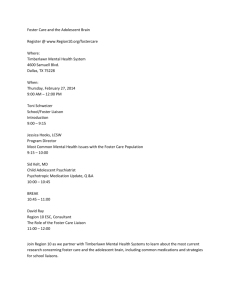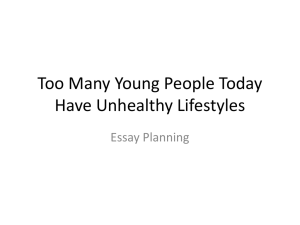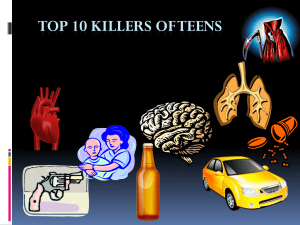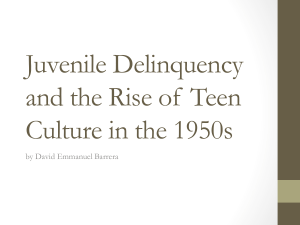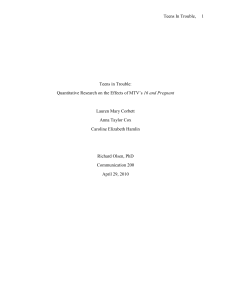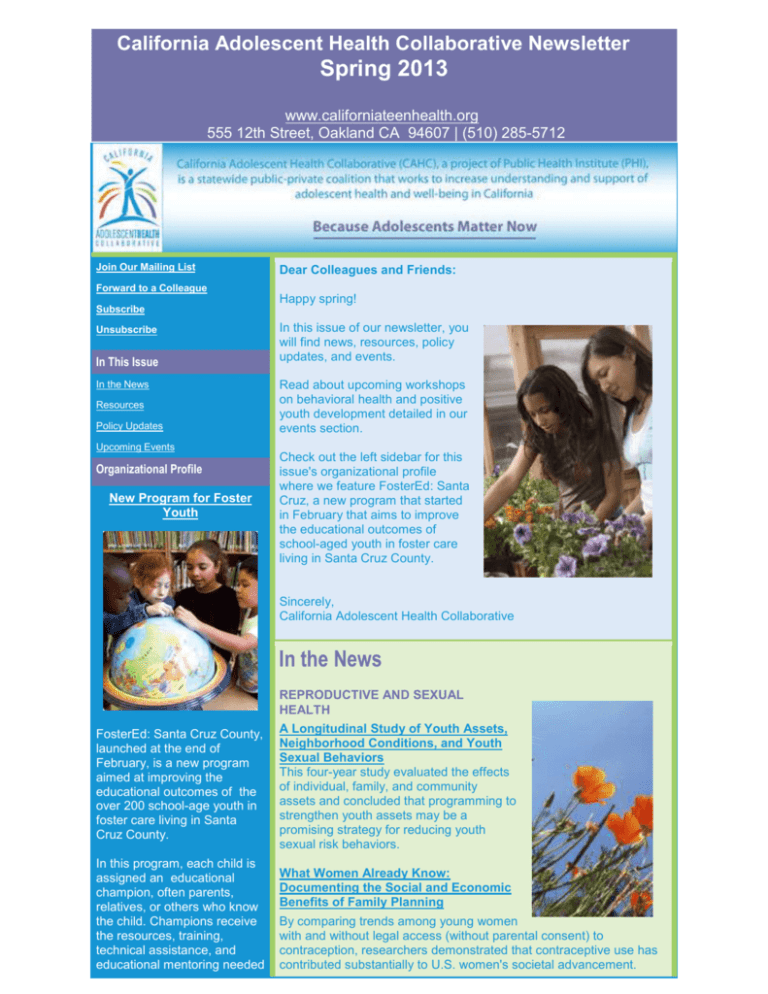
California Adolescent Health Collaborative Newsletter
Spring 2013
www.californiateenhealth.org
555 12th Street, Oakland CA 94607 | (510) 285-5712
Join Our Mailing List
Dear Colleagues and Friends:
Forward to a Colleague
Subscribe
Unsubscribe
In This Issue
In the News
Resources
Policy Updates
Upcoming Events
Organizational Profile
New Program for Foster
Youth
Happy spring!
In this issue of our newsletter, you
will find news, resources, policy
updates, and events.
Read about upcoming workshops
on behavioral health and positive
youth development detailed in our
events section.
Check out the left sidebar for this
issue's organizational profile
where we feature FosterEd: Santa
Cruz, a new program that started
in February that aims to improve
the educational outcomes of
school-aged youth in foster care
living in Santa Cruz County.
Sincerely,
California Adolescent Health Collaborative
In the News
REPRODUCTIVE AND SEXUAL
HEALTH
FosterEd: Santa Cruz County,
launched at the end of
February, is a new program
aimed at improving the
educational outcomes of the
over 200 school-age youth in
foster care living in Santa
Cruz County.
In this program, each child is
assigned an educational
champion, often parents,
relatives, or others who know
the child. Champions receive
the resources, training,
technical assistance, and
educational mentoring needed
A Longitudinal Study of Youth Assets,
Neighborhood Conditions, and Youth
Sexual Behaviors
This four-year study evaluated the effects
of individual, family, and community
assets and concluded that programming to
strengthen youth assets may be a
promising strategy for reducing youth
sexual risk behaviors.
What Women Already Know:
Documenting the Social and Economic
Benefits of Family Planning
By comparing trends among young women
with and without legal access (without parental consent) to
contraception, researchers demonstrated that contraceptive use has
contributed substantially to U.S. women's societal advancement.
to ensure they are able to
support the educational
success of the child.
FosterEd is an initiative of
The National Center For
Youth Law (NCYL). FosterEd:
Santa Cruz County is a pilot
for the state of California. The
project is overseen and
supported by the California
Department of Education,
California Department of
Social Services, California
Administrative Office of the
Courts, and the Child Welfare
Directors Association of
California. FosterEd also
operates in Indiana and
Arizona.
Quick Links
California Adolescent Health
Collaborative
.
National Center for Youth Law
.
National Adolescent and Young Adult
Health Information Center at UCSF
.
Adolescent Health Working Group
Specifically, these studies found that young women's access to
contraception was a major factor historically in the growing numbers
of young women obtaining a college education and pursuing
advanced professional degrees.
College Groups Connect to Fight Sexual Assault
Frustrated and angry over the handling of sexual assault cases at
Occidental College in Los Angeles, a group of students and faculty
members recently decided to take the matter to the federal
government as a civil rights case. They have connected through
social media and other networks with other students and faculty on
campuses around the nation.
BEHAVIORAL HEALTH
After the Death of a Friend: Young Men's Grief and Masculine
Identities
Using qualitative individual interviews and photo elicitation methods,
this study investigated the ways in which 25 men ages 19-25 grieved
the death of a male friend. The findings revealed men's predominant
grief responses as
emptiness, anger, stoicism
and sentimentality.
HEALTH CARE
DELIVERY
Medical Home for
Adolescents
This study examined rates
of having a medical home
for adolescents and
subgroups, including those with mental health conditions. Nearly half
of adolescents lacked a medical home in the past year. Rates were
lower for minority youth when compared to whites; lower-income and
uninsured youth; those in households that are non-English speaking
in which the respondent did not have some college; and those with
mental health as opposed to physical health conditions.
Reasons for Not Vaccinating Adolescents: National
Immunization Survey of Teens, 2008-2010
In this study, parents whose teens were not up to date for Pertussis
and meningococcal vaccines were asked the main reason they were
not vaccinated. Parents of female teens not up to date for human
papillomavirus (HPV) vaccine were asked their intent to give the HPV
vaccine. Those unlikely to get the HPV vaccine were asked the main
reason why not. The most frequent reasons for not vaccinating were
the same for Pertussis and meningococcal vaccines, including "Not
recommended" and "Not needed or not necessary." For HPV, the
most frequent reasons included those for the other vaccines as well
as four others, including "Not sexually active" and "Safety
concerns/Side effects."
TECHNOLOGY
Smartphone Adoption Among American Teens
A Pew Research Center survey found the following:
78% of teens now have a cell phone, and almost half own
smartphones. That translates into 37% of all teens who have
smartphones, up from just 23% in 2011.
23% of teens have a tablet computer, a level comparable to
the general adult population.
95% of teens use the internet.
93% of teens have a computer or have access to one at
home. Seven in ten teens with home computer access say
the laptop or desktop they use most often is one they share
with other family members.
Resources
CALIFORNIA HEALTH
Impact of Cuts in California's State Budget on Teen Pregnancy
Prevention Programs
Bixby Center for Global
Reproductive Health recently
released a research brief and
fact sheet describing the impact
of cuts in California's state
budget on teen pregnancy
prevention programs. California
built a successful infrastructure
of programs aimed at preventing
teen pregnancy through various
funding initiatives. Since 2008,
the California State Budget for
these teen pregnancy
prevention initiatives has been
reduced by 72%.
HEALTH CARE DELIVERY
The New Adolescents: An Analysis of Health Conditions,
Behaviors, Risks, and Access to Services Among Emerging
Young Adults
This report from the University of Southern California provides data
on health risks facing the nation's 34.6 million emerging young adults,
ages 18 to 25. These data are intended to help health care providers,
health care networks and vendors, institutions, and policy makers
make informed decisions about broad health care coverage and
health prevention interventions for emerging young adults.
REPRODUCTIVE HEALTH
Facts on American Teens' Sexual and Reproductive Health
This resource lists facts from the Guttmacher Institute on sexual
activity, contraceptive use, access to contraceptive services, STIs,
pregnancy, childbearing, fatherhood, and abortion. One fact from this
report: The majority of sexually experienced teens (78% of females
and 85% of males) used contraceptives the first time they had sex.
Policy Updates
The Real Education for Healthy Youth Act
The Real Education for Healthy Youth Act (S. 1782/H.R. 3324),
introduced by Senator Frank Lautenberg (D-NJ) and Representative
Barbara Lee (D-CA), would ensure that federal funding is allocated to
comprehensive sexual health education programs that provide young
people with the skills and information they need to make informed,
responsible, and healthy decisions. This legislation sets forth a vision
for comprehensive sexual health education programs in the United
States.
Senate Bill 138 - The Confidential Health Information Act
Sponsored by the California Family Health Council, this bill will
protect confidentiality and personal,
sensitive health information by
requiring stronger confidentiality
protections in all private health
insurance products, lessening the
burden on the insured dependent to
opt-in to confidentiality protections
and clarifying definitions and closing
loopholes.
Senate Bill 528 - Aids Young
Parents in Foster Care System
This bill will ensure that there is
adequate preparation for the birth of a
foster youth's child by implementing
specialized pregnant and parenting
teen (PPT) conferences. It will also
make the children of parenting foster
youth eligible for subsidized child care and ensure that all children in
foster care have access to medically-accurate, age-appropriate
reproductive health education. Finally, it will require the State of
California's Department of Social Services to track the number of
parenting youth in foster care; currently the number of parenting
youth are in foster care is unknown.
Upcoming Events
Positive Youth Development Training, San Diego, April 22, 2013
Sponsored by the California Adolescent Health Collaborative and the
County of San Diego, Health and Human Services Agency, this
training provides an introduction to the theory and principles of
Positive Youth Development, such as understanding resilience and
internal and external assets.
YTH Live, San Francisco, April 7-9, 2013
Formerly Sex::Tech, this is an annual conference sponsored by ISIS,
is a chance for youth leaders, techies and health professionals to get
together, network and innovate.
Behavioral Health Training, Yolo County, May 17, 2013
Sponsored by the California Adolescent Health Collaborative and
the Yolo County Health Department, MCAH Branch, this training,
Integrating Behavioral Health and Primary Care, is geared toward
providers who serve youth and young adults.
National School-Based Health Care Convention, Washington
D.C., June 23-26, 2013
This conference will have the latest best practices, resources, and
networking opportunities. This year's theme is "Redefining Health for
Kids and Teens".
Show your
support!
If you want to contribute, please visit us at http://www.californiateenhealth.org/about-us/donate .
CAHC is proudly supported by Maternal, Child and Adolescent Health Program, Center for
Family Health, California Department of Public Health; National Institute of Justice, U.S.
Department of Justice; and Centers for Disease Control and Prevention at the Department of
Health and Human Services.
California Adolescent Health Collaborative



